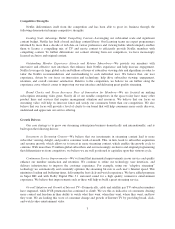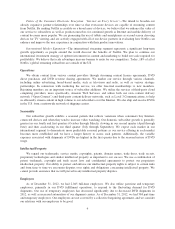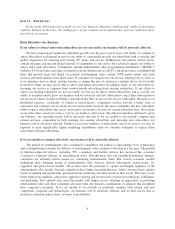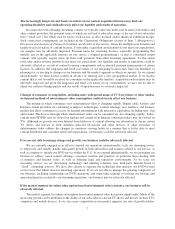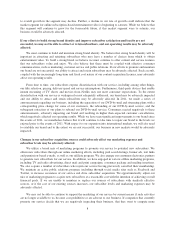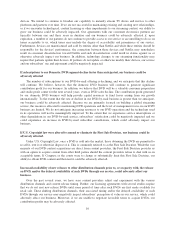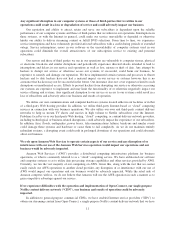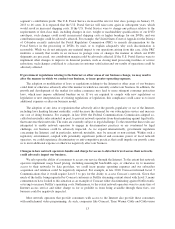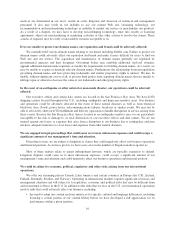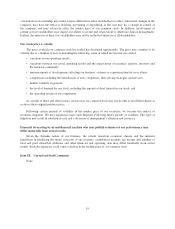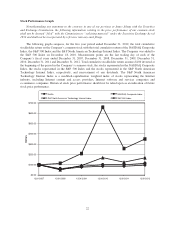NetFlix 2012 Annual Report Download - page 17
Download and view the complete annual report
Please find page 17 of the 2012 NetFlix annual report below. You can navigate through the pages in the report by either clicking on the pages listed below, or by using the keyword search tool below to find specific information within the annual report.segment’s contribution profit. The U.S. Postal Service increased the rate for first class postage on January 23,
2013 to 46 cents. It is expected that the U.S. Postal Service will raise rates again in subsequent years, which
would result in increased shipping costs. If the U.S. Postal Service were to change any policies relative to the
requirements of first-class mail, including changes in size, weight or machinability qualifications of our DVD
envelopes, such changes could result in increased shipping costs or higher breakage for our DVDs, and our
contribution margin could be adversely affected. For example, the United States Court of Appeals for the District
of Columbia recently instructed the Postal Regulatory Commission (PRC) to remedy discrimination by the
Postal Service in the processing of DVDs by mail, or to explain adequately why such discrimination is
reasonable. While we do not anticipate any material impact to our operations arising from this case, if the PRC
institutes a remedy that results in an increase in postage rates or changes the manner in which our DVD
shipments are processed, our contribution margin could be adversely affected. If the U.S. Postal Service were to
implement other changes to improve its financial position, such as closing mail processing facilities or service
reductions, such changes could lead to a decrease in customer satisfaction and our results of operations could be
adversely affected.
If government regulations relating to the Internet or other areas of our business change, we may need to
alter the manner in which we conduct our business, or incur greater operating expenses.
The adoption or modification of laws or regulations relating to the Internet or other areas of our business
could limit or otherwise adversely affect the manner in which we currently conduct our business. In addition, the
growth and development of the market for online commerce may lead to more stringent consumer protection
laws, which may impose additional burdens on us. If we are required to comply with new regulations or
legislation or new interpretations of existing regulations or legislation, this compliance could cause us to incur
additional expenses or alter our business model.
The adoption of any laws or regulations that adversely affect the growth, popularity or use of the Internet,
including laws limiting Internet neutrality, could decrease the demand for our subscription service and increase
our cost of doing business. For example, in late 2010, the Federal Communications Commission adopted so-
called net neutrality rules intended, in part, to prevent network operators from discriminating against legal traffic
that transverse their networks. The rules are currently subject to legal challenge. To the extent that these rules are
interpreted to enable network operators to engage in discriminatory practices or are overturned by legal
challenge, our business could be adversely impacted. As we expand internationally, government regulation
concerning the Internet, and in particular, network neutrality, may be nascent or non-existent. Within such a
regulatory environment, coupled with potentially significant political and economic power of local network
operators, we could experience discriminatory or anti-competitive practices that could impede our growth, cause
us to incur additional expense or otherwise negatively affect our business.
Changes in how network operators handle and charge for access to data that travel across their networks
could adversely impact our business.
We rely upon the ability of consumers to access our service through the Internet. To the extent that network
operators implement usage based pricing, including meaningful bandwidth caps, or otherwise try to monetize
access to their networks by data providers, we could incur greater operating expenses and our subscriber
acquisition and retention could be negatively impacted. For example, in late 2010, Comcast informed Level 3
Communications that it would require Level 3 to pay for the ability to access Comcast’s network. Given that
much of the traffic being requested by Comcast customers is Netflix streaming content stored with Level 3, many
commentators have looked to this situation as an example of Comcast either discriminating against Netflix traffic
or trying to increase Netflix’s operating costs. Furthermore, to the extent network operators were to create tiers of
Internet access service and either charge us for or prohibit us from being available through these tiers, our
business could be negatively impacted.
Most network operators that provide consumers with access to the Internet also provide these consumers
with multichannel video programming. As such, companies like Comcast, Time Warner Cable and Cablevision
13


